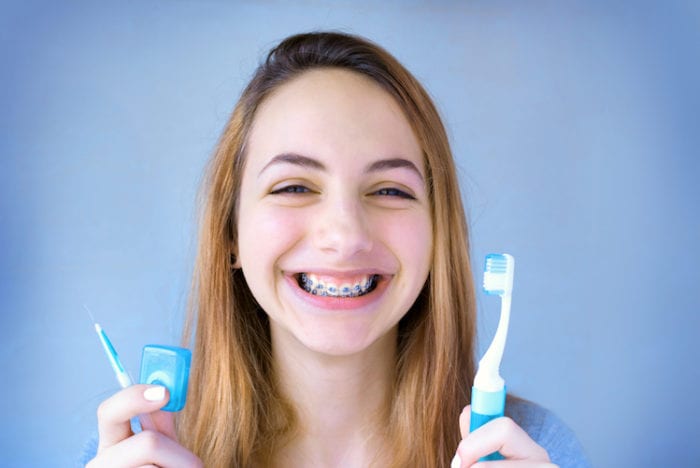Enjoying the best possible results from your orthodontic treatment depends on compliance with the recommended oral hygiene and lifestyle adjustments. Metal braces will require the most care and diligence to avoid damage to the brackets or wires. Clear braces, or aligners, require less care than metal braces but still need periodic maintenance.
The success of your orthodontic treatment will depend on your efforts. Dr. Rever and our professional dental team will go over the daily care of your braces during your visit.

Oral Hygiene with Braces
Metal braces and oral appliances can make daily brushing and flossing seem challenging. However, cleaning your teeth and gums effectively and avoiding tooth decay during your treatment is possible. Your hygienist can demonstrate the techniques for brushing as much of the tooth surface as possible without causing any damage.
Daily oral hygiene not only removes bacteria that can cause decay but also keeps the gum tissue healthy and avoids changes in the gum line that can affect the appearance of your smile after treatment. It is important to use a soft-bristled toothbrush, floss each day, and discuss any changes in the gums with Dr. Rever.
- Brushing with braces: With or without braces, patients should brush twice a day with the toothbrush at a straight angle, using circular motions to remove food particles and plaque. When wearing braces, brushing more frequently is recommended to keep food from lodging between the brackets and teeth- which could lead to an increased risk of tooth decay.
- Flossing with braces: Dr. Rever recommends that patients that wear braces use dental floss to remove food and plaque buildup. Floss can be pulled under the archwire for effective daily flossing using a floss threader.
- Fluoride treatments: For patients more prone to tooth decay, Dr. Rever may recommend a fluoride treatment to improve your resistance to decay. Fluoride treatments are noninvasive and can be completed during your routine dental health exam or braces checkup.
Dr. Rever will monitor the health of your teeth and gums throughout your orthodontic care and recommend any specific at-home products, such as an antibacterial rinse, to keep your smile healthy.
Foods to Avoid With Braces
Dietary restrictions are recommended to help patients avoid damaging braces with food. This includes food that is sticky, hard, or prone to becoming lodged in the brackets. This list typically includes:
- Chewing gum
- Popcorn
- Ice
- Hard candies
- Chewy or gummy-style candy
- Nuts and other hard foods
- Taffy and licorice
Eating a nutritious diet with minimal added sugars can also help you avoid tooth decay or cavities. Especially in those difficult-to-clean places while you are wearing braces. Rinsing your mouth after consuming sugary snacks or drinks is important to minimize bacteria on the tooth surfaces that can lead to decay or tooth staining.
How long after getting braces can you eat normal foods?
Dr. Rever usually recommends waiting for about a week before going back to eating normally after getting your braces removed. This allows your teeth to get used to being without braces. It also prevents the shifting of teeth right after getting your braces removed.
Always wear your retainer, or at least when Dr. Rever recommends it. Your retainer is the last step in ensuring your teeth stay aligned after orthodontic treatments.
Do you have more questions about a lifestyle with braces? Call Advanced Total Dental Care at (301) 637-0960, or schedule a visit online today.
